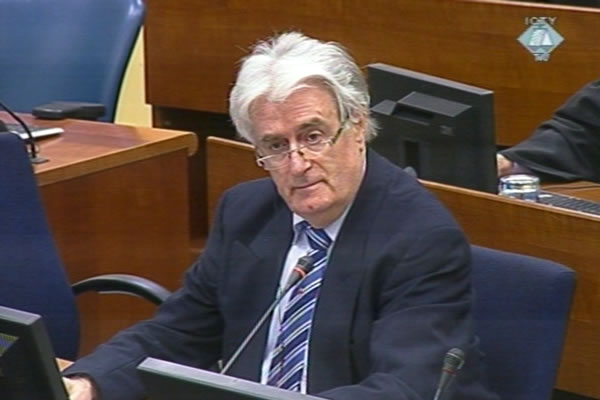Home
KARADZIC SEEKS A REMATCH
After his attempt to disqualify all the judges in his Trial Chamber failed, Karadzic has filed a new motion for a re-trial based on ‘the cumulative effect’ of the prosecution’s failure to disclose the evidence on time
 Radovan Karadzic in the courtroom
Radovan Karadzic in the courtroom The Trial Chamber has dismissed the motion filed by the accused Radovan Karadzic to disqualify the entire chamber: permanent judges Kwon and Morrison, and ad litem judges Baird and Latanzzi. The accused alleged in his motion that their terms of office, conferred by the UN General Assembly, expired on 16 July. Karadzic believes that the UN Security Council has overstepped its bounds last December, when it extended the judges’ terms until the end of this year, or until the end of the trial of the former Republika Srpska president.
In the decision dismissing the motion, the Chamber notes that the Tribunal’s judges are elected by the General Assembly, and that the Statute envisages the possibility of their re-election, without stipulating which body has the power to do so. The Chamber invokes the decision of the Appeals Chamber in the Krajisnik case, to state that the Security Council has the power to issue and implement decisions, including those that pertain to the judges’ term of office. The Chamber also reminds Karadzic that the General Assembly confirmed the Security Council resolution extending the judges’ terms of office to 31 December 2014.
Karadzic refuses to give up: in the meantime, he has filed a motion for a re-trial, stating that the prosecution has many times ‘breached its obligation to disclose’ exculpatory evidence. This has caused prejudice to the defense and has violated Karadzic’s right to a fair trial.
In August 2012, Karadzic filed a similar motion which was rejected by the Chamber.At that time, the judges ruled that the scope of the damage did not call for a re-trial. According to Karadzic, the prosecution has violated the disclosure obligation 73 times in the past five years, and persists in doing so. This has caused negative ‘cumulative effects’ for the preparation of Karadzic’s defense.
As Karadzic concluded, the Tribunal is founded on a concept that ‘when impunity for wrongdoing is ended, the wrongdoing will cease’. The same principle should apply to the prosecution in his case. The Chamber is ‘the guardian of the right of an accused to a fair trial’ and should not ‘look the other way in embarrassment’, Karadzic argues. ‘When disclosure is a failure, the trial is a failure’, Karadzic concludes, calling for a new trial as the only legal remedy for the continued breaches of the obligation to disclose exculpatory material.
The former Republika Srpska president is on trial for double genocide and other crimes in Bosnia and Herzegovina. Both the prosecution and the defense have rested their cases and the closing arguments have been scheduled for 29 September. The accused will then have to step out of the limelight. This is why Karadzic is now trying to get a re-match or at least to go into extra time in order to get some more time on stage, and to remain in the public eye for a while longer.
Linked Reports
- Case : Karadzic
- 2014-07-17 KARADZIC SEEKS DISQUALIFICATION OF ALL TRIAL CHAMBER JUDGES
- 2014-06-09 MERON GRANTS KARADZIC'S REQUEST
- 2014-05-23 KARADZIC’S MOTION FOR BIFURCATED JUDGMENT DENIED
- 2014-08-14 NO RE-MATCH IN KARADZIC CASE
- 2014-08-22 KARADZIC MOTION TO INVESTIGATE PROSECUTION DENIED
- 2014-08-26 KARADZIC HAS NEW EVIDENCE OF ‘MUSLIM CRIMES’
